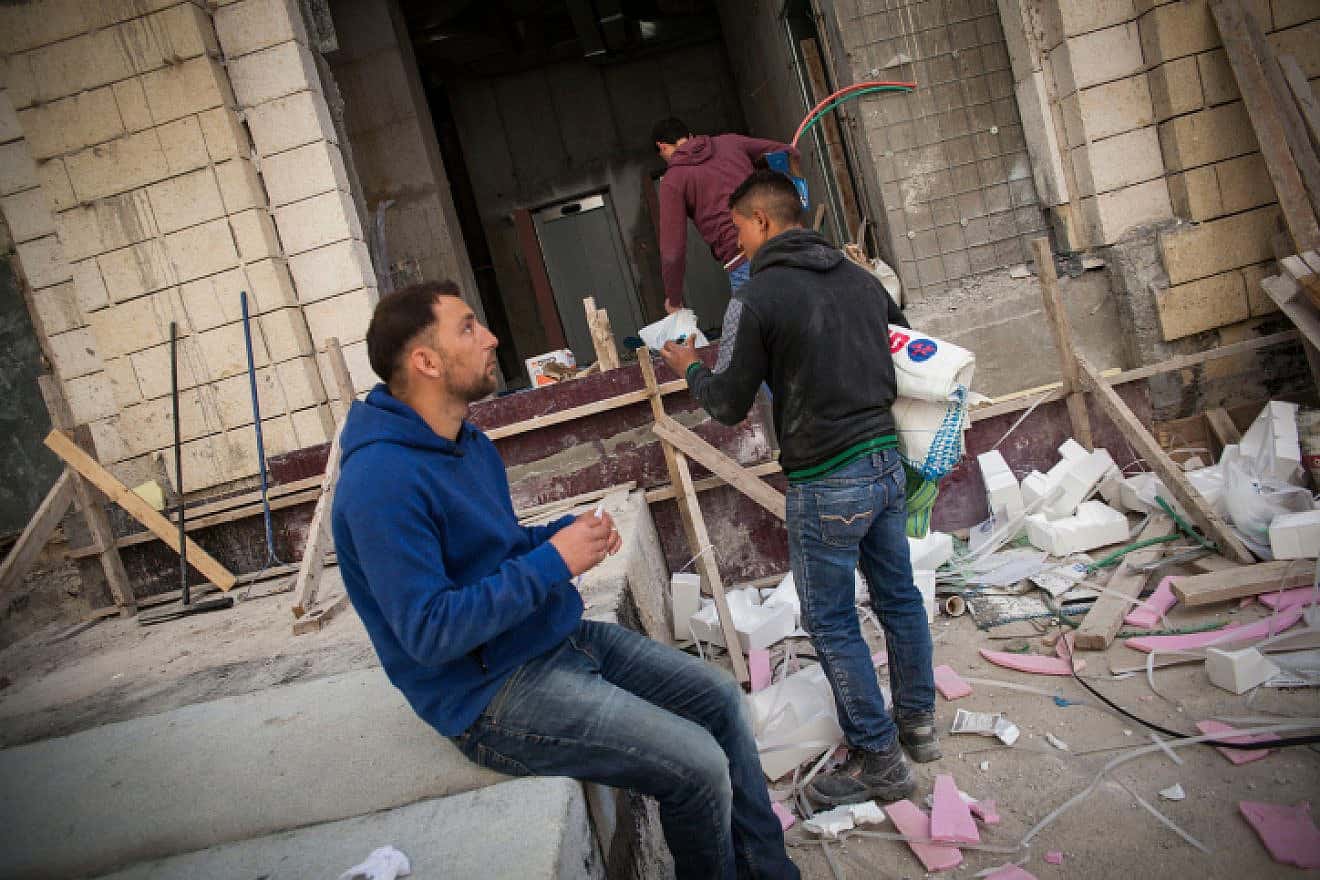by David Isaac
Israelis in the region don't want Palestinian laborers returning to their communities due to the threat of terrorism.
 |
Arab workers at a construction site in central Jerusalem, Feb. 26, 2017. Photo by Nora Savosnick/Flash90. |
A group calling itself “Defending the Home Forum” organized simultaneous protests on Saturday evening against the return of Palestinian Arab workers to Jewish communities in Judea and Samaria.
“It is inconceivable that after the disaster in the ‘Gaza envelope’ we still continue to let the enemy into our communities, give the Arabs the opportunity to gather intelligence and finance the next massacre for them,” Leah Freiman, one of the organizers, told Channel 14.
Representatives of the group will meet in the coming days with Binyamin Regional Council Chairman Yisrael Gantz and MK Tzvi Sukkot of the Religious Zionism Party, who chairs the Knesset Foreign Affairs and Defense Committee’s subcommittee for Judea and Samaria.
Yona Darf, spokeswoman for the town of Nahliel, who participated in one of the protests, told JNS that Arab workers employed on a community construction project halted due to the Oct. 7 massacre are slated to return to work soon.
Palestinians are also employed as sanitation workers by the Binyamin Regional Council, where Nahliel is located. “It’s not just a construction project where it’s closed and with guards. Arabs come in with trucks to clear out the trash in every town,” said Darf.
“While it’s true that these workers have a security clearance to work in the settlements, which involves a whole approval process, we know in practice that on Oct. 7, workers who had permits cooperated with Hamas, either as actual accomplices or by passing on information to the terrorists,” she told JNS.
Survivors of the Hamas massacre have reported that terrorists knew about their communities in great detail, including where people responsible for local security lived and where weapons were stored.
“It was already a problem before, but now it is really clear to everyone that this is a big issue,” said Darf. “There are quite a few Arabs, if not all of them, who want vengeance for Israel’s actions in Gaza.”
Some 200,000 Palestinian workers were employed throughout Israel before Oct. 7. Of those, 30,000 worked in Judea and Samaria.
The number dropped to zero in the immediate aftermath of the Hamas massacre, until Israel began tightening restrictions to address the ensuing shortage of workers. In late October, Israel authorized the entry of 8,000 Palestinian workers from Judea and Samaria into Israel.
They were dispatched to “vital” industrial areas, food factories, medical facilities and burial societies, a security official told JNS. Palestinians were also hired to work at hotels, including those housing evacuees from areas struck by Hamas.
Last month, National Security Minister Itamar Ben-Gvir called on the government to reverse the decision to let in those 8,000, citing security concerns.
Also coming in for criticism was a decision in early November by IDF Maj. Gen. Yehuda Fuchs, head of IDF Central Command, to let Palestinians conduct their olive harvest close to Israeli communities in Judea and Samaria. A woman’s group quickly formed to protest the move, complaining that Fuchs’ permission came after several Palestinians had been recently caught observing the settlements.
Some Jewish communities, including Leshem and Alei Zahav, both in Samaria, physically blocked Palestinian workers from entering.
Despite the protests, the IDF decided in late November to further loosen the rules, letting Arab workers return to isolated construction sites, gardening and sanitation work.
The IDF is concerned that if Palestinians lose employment in Israel, even more of them will turn to terrorism. Palestinians working in Israel account for 35% of the Palestinian Authority’s GDP, according to the Palestinian Monetary Authority.
On Dec. 1, during a hearing of the Knesset Foreign Affairs and Defense Committee’s subcommittee for Judea and Samaria, a legal adviser said that regional councils have no authority to prevent Arab laborers from entering settlements once the IDF OKs it.
“It’s simply absurd. The court [system] decided that settlements have no legal right whatsoever to say that they won’t allow the entry of such workers,” said Darf.
“Also, a construction contractor can sue the settlement if it’s not prepared to let them in. He can say the settlement is causing him damages. Basically, this binds our hands and tells us, ‘Please open up your house to your enemies. If not you are exposed to a lawsuit,'” she said.
As to the solution, Darf said that’s the job of the decision-makers, and that communities like hers shouldn’t be expected to come up with one.
“In the Shiloh [community] bloc, we know that they organized and resolutely opposed the introduction of Arab workers, and the [Binyamin Regional] Council doesn’t allow Arab sanitation workers, only Jewish ones,” said Darf. “So solutions exist.”
David Isaac
Source: https://www.jns.org/jewish-residents-protest-the-return-of-arab-workers-to-judea-and-samaria/
No comments:
Post a Comment